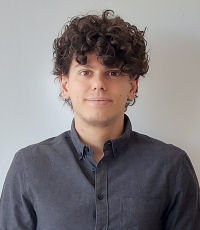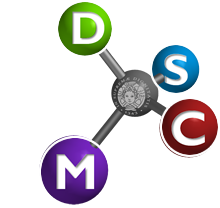
Contacts:
Supervisor(s):
Prof. Lorenzo Cupellini
Prof. Fabrizio Santoro
Title of the PhD project:
Development and application of methods for excited-state dynamics and spectroscopy of multichromophoric systems.
Abstract of the PhD project:
Multichromophoric systems are common in chemistry and material sciences. Nucleic acids and light-harvesting complexes are examples of well-studied multichromophoric systems of biological origins. The interaction of these systems with light gives rise to their excited-state dynamics, which is dominated by both intra- and inter-chromophore interactions.
The study of excited-state dynamics is fundamental to fully understand several photochemical phenomena, such as in photoreceptors, natural and artificial light-harvesting systems. Spectroscopy represents the primary source of knowledge about the excited states and their dynamics in multichromophoric systems. Specifically, time-resolved spectroscopies can give insights into the complex photophysics of multichromophoric systems. However, the presence of multiple convoluted signals in these spectroscopies, together with other experimental limitations, can hide many spectral features thus preventing a complete mapping of all excited-state processes. Computational techniques help to disentangle the measured signals by directly simulating the excited state dynamics and its spectral signatures. Particularly, detailed high-resolution structure of multichromophoric aggregates, combined with QM calculations have also enabled to run bottom-up simulations “from scratch”, which allow obtaining a deeper understanding of studied systems.
On these grounds, the aim of my work is to develop an efficient and reliable approach for the simulation of the excited-state dynamics in multichromophoric systems. This method will be extended to the simulation of the related ultrafast spectroscopies to allow a direct comparison with experiments. As a gold-standard benchmark, the Multiconfiguration Time-Dependent Hartree method will be employed to simulate the dynamics in model systems. The developed methods will be employed for the simulation of the excited-state-dynamics and of pump-probe spectra in CP29, one of the light-hravesting complexes present in photosyntetic organisms.
Publications:
• P. Saraceno, P., Sláma, V. & Cupellini, L. First-principles simulation of excitation energy transfer and transient absorption spectroscopy in the CP29 light-harvesting complex. The Journal of Chemical Physics 159, 184112 (2023), https://doi.org/10.1063/5.0170295
• Saraceno, P.; Sardar, S.; Caferri, R.; Camargo, F. V. A.; Dall’Osto, L.; D’Andrea, C.; Bassi, R.; Cupellini, L.; Cerullo, G.; Mennucci, B., Probing the Effect of Mutations on Light Harvesting in CP29 by Transient Absorption and First-Principles Simulations, The Journal of Physical Chemistry Letters 2024, 15, XXX, 6398–6408,https://doi.org/10.1021/acs.jpclett.4c01040
• E. Betti, P. Saraceno, E. Cignoni, L. Cupellini, B. Mennucci, Insights into Energy Transfer in Light-Harvesting Complex II Through Machine-Learning Assisted Simulations, (2024), J. Phys. Chem. B, 128, 21, 5188–5200, https://dx.doi.org/10.1021/acs.jpcb.4c01494
• G. Salvadori, P. Saraceno, A. Santomieri, C. John, L. Pedraza-González. Structural and spectroscopic basis of excitation energy transfer in microbial rhodopsins binding xanthophylls (2025). Chemical science, 16, 1-6. https://doi.org/10.1039/D5SC04961J
• P. Saraceno, F. Santoro & L. Cupellini. Quantum dynamics simulations reveal ultrafast and coherent charge transfer in the Lhca4 antenna of Photosystem I. The Journal of Physical Chemistry Letters 0,16 (2025), https://doi.org/10.1021/acs.jpclett.5c02463
• P. Saraceno, A. Bhartiya, J. Seibt, T. Renger, T. Kramer, L. Cupellini. Evaluation of approximate lineshape theories for photosynthetic light-harvesting antennae. The Journal of Chemical Physics 2026 164 (4): 044119 https://doi.org/10.1063/5.0310361
Oral communications at conferences:
• Saraceno, P., Sardar, S., Slama, V., D’Andrea, C., Camargo, F., Cerullo, G., Cupellini, L., Mennucci, B., Modeling energy-transfer processes in the light-harvesting complex CP29: first principles simulation of transient absorption spectroscopy; CFF 2023 – Chemistry for the Future International Conference; Università di Pisa; Dipartimento di Chimica e Chimica Industriale, Via Giuseppe Moruzzi, 13 – Pisa, June 30, 2023
• Saraceno, P., Sardar, S., Slama, V., D’Andrea, C., Camargo, F., Cerullo, G., Cupellini, L., Mennucci, B., First-principles simulations of CP29 unveil the effect of mutations on light harvesting; Workshop Light Harvesting in Biological Systems 2024; September 10, 2024, H 36, NW III / University of Bayreuth
• Saraceno, P., Bhartiya A., Renger T., Cupellini L, Simulating spectroscopy of multichromophoric systems: might approximation in lineshape theories lead to misinterpretation of experimental spectra?; Workshop on Quantum Dynamics and Spectroscopy of Functional Molecular Materials and Biological Photosystems; École de Physique des Houches – March 2– 7, 2025
• Saraceno, P., Sardar, S., Slama, V., D’Andrea, C., Camargo, F., Cerullo, G., Santoro F., Cupellini, L., Mennucci, B., From Complexity to Insight: First-Principles Simulations of Light-Harvesting in Plant Antennas; CFF 2025 - Chemistry for the Future International Conference; Università di Pisa; Dipartimento di Chimica e Chimica Industriale, Via Giuseppe Moruzzi, 13 – Pisa, July 7-9, 2025
• Saraceno, P., Sardar, S., Slama, V., D’Andrea, C., Camargo, F., Cerullo, G., Santoro F., Cupellini, L., Mennucci, B., First-principles simulations unveil the effect of mutations on light harvesting; 21st Congress of European Society for Photobiology (ESP); Politecnico di Bari, August 24-28, 2025
Poster communications at conferences:
• Saraceno, P., Sardar, S., Slama, V., D’Andrea, C., Camargo, F., Cerullo, G., Cupellini, L., Mennucci, B., Modeling energy-transfer processes in the light-harvesting complex CP29: first principles simulation of transient absorption spectroscopy; CFF 2023 – Chemistry for the Future International Conference; Università di Pisa; Dipartimento di Chimica e Chimica Industriale, Via Giuseppe Moruzzi, 13 – Pisa, June 28 – June 30, 2023
• Saraceno, P., Sardar, S., Slama, V., D’Andrea, C., Camargo, F., Cerullo, G., Cupellini, L., Mennucci, B., Modeling energy-transfer processes in the light-harvesting complex CP29: first principles simulation of transient absorption spectroscopy; EuChems Comp 2023, Thessaloniki Olympic Museum, Salonicco (Grecia), August 27 – August 31, 2023
• Saraceno, P., Sardar, S., Slama, V., D’Andrea, C., Camargo, F., Cerullo, G., Cupellini, L., Mennucci, B., Modeling energy-transfer processes in the light-harvesting complex CP29: first principles simulation of transient absorption spectroscopy; VIII Congresso Nazionale della Divisione di Chimica Teorica e Computazionale della SCI, Scuola Superiore Normale, Pisa, September 20 – September 22, 2023
• Saraceno, P., Sardar, S., Slama, V., D’Andrea, C., Camargo, F., Cerullo, G., Cupellini, L., Mennucci, B., Modeling energy-transfer processes in the light-harvesting complex CP29: first principles simulation of transient absorption spectroscopy; CNR, Pisa, November 09 – November 10, 2023
• Saraceno, P.; Sardar, S.; Caferri, R.; Camargo, F. V. A.; Dall’Osto, L.; D’Andrea, C.; Bassi, R.; Cupellini, L.; Cerullo, G.; Mennucci, B., Probing the Effect of Mutations on Light Harvesting in CP29 by Transient Absorption and First-Principles Simulations, The Journal of Physical Chemistry Letters 2024, 15, XXX, 6398–6408.; CFF 2024 – Chemistry for the Future International Conference; Università di Pisa; Dipartimento di Chimica e Chimica Industriale, Via Giuseppe Moruzzi, 13 – Pisa, July 03 – July 05, 2024
• Saraceno, P.; Sardar, S.; Caferri, R.; Camargo, F. V. A.; Dall’Osto, L.; D’Andrea, C.; Bassi, R.; Cupellini, L.; Cerullo, G.; Mennucci, B., Probing the Effect of Mutations on Light Harvesting in CP29 by Transient Absorption and First-Principles Simulations, The Journal of Physical Chemistry Letters 2024, 15, XXX, 6398–6408.; WATOC 2025 – 13th Triennial Congress of the World Association of Theoretical and Computational Chemists – Oslo (Norway), June 22–27, 2025
Other achievements:
...

